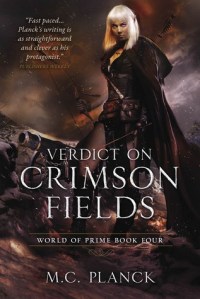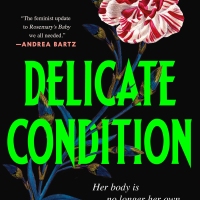Guest post: “Goodness in a Nietzschean World” by M.C. Planck
 Today, we’re pleased to welcome author M.C. Planck to the BiblioSanctum to celebrate the release of Black Harvest, his newest novel and the fifth installment in the World of Prime sequence! Hard to believe how quickly time has flown and how much this series has expanded. The still recall with excitement the first book Sword of the Bright Lady with its world reminiscent of a video game, complete with fearsome monsters to be defeated and powerful rewards to be gained. It reminds me I really need to get back into this series full of magic, adventure, combat, and strategy! In the meantime though, I hope you enjoy this guest post by the author as he shares with us the influences behind his RPG and gaming-inspired world. Released June 11, 2019 by Pyr Books, Black Harvest is now available at bookstores everywhere, be sure to check it out!
Today, we’re pleased to welcome author M.C. Planck to the BiblioSanctum to celebrate the release of Black Harvest, his newest novel and the fifth installment in the World of Prime sequence! Hard to believe how quickly time has flown and how much this series has expanded. The still recall with excitement the first book Sword of the Bright Lady with its world reminiscent of a video game, complete with fearsome monsters to be defeated and powerful rewards to be gained. It reminds me I really need to get back into this series full of magic, adventure, combat, and strategy! In the meantime though, I hope you enjoy this guest post by the author as he shares with us the influences behind his RPG and gaming-inspired world. Released June 11, 2019 by Pyr Books, Black Harvest is now available at bookstores everywhere, be sure to check it out!
![]()
GOODNESS IN A NIETZSCHEAN WORLD
by M.C. Planck
Many people are aware now of the literary influence of Jack Vance on Dungeons and Dragons, and thus by extension on the entire RPG world that has been created by, around, or in counterpoint to that game. Vance created spells that have to be memorized, the concept of levels for both magic and sword-fighting, and a ruined world full of forgotten marvels and outlandish monsters.
I think it is less obvious how much Nietzsche contributed to the genre with the concept of “that which does not destroy us makes us stronger.” In the Nietzschean view, as in all level-based RPGs, struggle and victory result in increased power, which enables even greater struggles and victories.
This is not how it works in Real Life. Professional boxers do not become better boxers by winning prize fights; instead, they routinely practice against opponents who are careful not to hurt them. They time their work-outs to taper off just before a big match so they will be fresh for the fight, and they require lengthy recovery time afterwards before they are ready for the next one. Victory brings recognition and financial rewards, which may then fuel future training, but victory itself is of no value to the fighter.
Or, as is often said of chess, you only learn from games you lose.
But that doesn’t make for a very fun role to play, and it doesn’t drive the apotheosis of the uberman which we call “levelling.” In D&D and its variants, one gains power not through practice but through victory; it is a running joke that an academic sitting in his tower studying ancient tomes masters the arcane arts less successfully than an adventurer blasting goblins to bits on a daily basis.
Many fantasy novels tend to simply ignore this rift between the games we play and the books we read. The peculiarities of level and progressive victory are written of as rounding errors in the mechanics, blemishes that show how difficult it is to simulate a world in a set of game rules.
For my book Sword of the Bright Lady, I wanted to examine those concepts directly. I wanted to see what the world would look like if the rounding errors were really real. I wanted to know what it would be like to live in the world we play in, rather than attempting to play in the world we live in.
In the World of Prime, you really do get better through victory: levels, and the supernatural powers they bring, are gained by consuming the souls of the slain. Training has its purpose and mortal warriors still use it, but even the greatest Olympian is easily outclassed by a serial killer with a body count in the dozens. By making souls a tangible commodity that can be harvested, bought, and sold, I managed to organically derive every trope of the genre: kings really are all fantastic swordsmen, wizards will make you magic swords for a price, side-quests are a perfectly reasonable way to prepare for saving the world, and murder-hobo is a legitimate career choice.
Once I created this world, I discovered an even more interesting question: how does one do good in a world where the power to do good comes from eating people’s brains? What is the difference between a saint and a sinner, if both of them have gained their position through the deaths of innocents? Is the ability to heal the sick and raise the dead worth ten thousand corpses?
How can you gain powers that make you more than human, at such a terrible price, and yet remain true to yourself and your morality? That is the question I set out to answer in Sword of the Bright Lady. My protagonist, Christopher Sinclair, is a modern person because I wanted a morality and a viewpoint we could relate to. He is an engineer because I wanted him to be a problem-solver. He becomes a priest of Good because I wanted to see how he did it. Along the way there are some great sword-fights and cool spells, which hopefully keep the story interesting, but also give me the opportunity to poke fun at any number of silly situations that appear in our games and yet, in the World of Prime, turn out to be perfectly reasonable responses to the inherent absurdity and cruelty of an genuinely Nietzschean world.
![]()
M.C. Planck is the author of the World of Prime fantasy series of novels and the science fiction novel The Kassa Kambit. After a nearly-transient childhood, Mike hitchhiked across the country and ran out of money in Arizona. So he stayed there for thirty years, raising dogs, getting a degree in philosophy and founding a scientific instrument company. Having read virtually everything by the old masters of SF&F, he decided he was ready to write. A decade later, he was actually ready and relieved to find that writing novels is easier than writing software, as a single punctuation error won’t cause your audience to explode and die. When he ran out of dogs, he moved to Australia to raise his daughter with kangaroos.


















Oops, I can see now that I only read two of them. I am so behind on things
LikeLike
This is the last one in the series, so you have time to catch up now. I’m no Robert Jordan. 😀
LikeLike
Haha, oh I read that series for 15 years or smth
LikeLike
I stopped somewhere around book 9 or 10, I think. I wanted to know how it ended but not that much.
LikeLike
Not even the dry parts made me give up. Viva la Dragon! lol. Still things at the end made me angry so maybe I should have stopped
LikeLike
“’m no Robert Jordan” – Haha, I do prefer my series to end, thanks! 😀
LikeLike
You’re farther ahead than me! 😀
LikeLike
‘how does one do good in a world where the power to do good comes from eating people’s brains?’ – that certainly does present a dilemma doesn’t it.
I’ve not read this series so must go and check it out although it sounds like I’m already so far behind.
Thanks
Lynn 😀
LikeLike
The world is fascinating, I really liked the RPG aspect. I would recommend checking it out if that appeals to you 😀
LikeLike
Well Mogsy these covers are real artwork!
LikeLike
Gene Mollica did the first four. He also did the “Promise of Blood” covers, which I thought were fantastic.
LikeLike
I agree, they are gorgeous! And I love the work of Gene Mollica, he does some incredible photo-realistic covers.
LikeLike
I know I have a couple of these books, but for some reason never started this series. Book 5 already! Really interesting guest post, it definitely makes me want to start reading😁
LikeLike
Yup, I can’t believe it’s been so long since I read book 1. Now the fifth book is out. Time flies.
LikeLike
Oh all that is really intriguing! Thanks for sharing!
LikeLike
Yes, thank you so much for stopping by, M.C.! 😀
LikeLike
Even though I’m no gamer, this series’s core concept intrigues me – and those covers are indeed a feast for the eyes! 🙂
LikeLike
The cover for Verdant Court was so good, it made me want to write a better book for it.
LikeLike
Yeah, the first four covers are incredible. But I love love love the purple of the fifth book too. I can tell it’s a different style (because of the different artist, perhaps) but I like the simplicity of the background, it’s very elegant and suits the cover.
LikeLike
I passed your comments on to the artist. She was very pleased. 🙂
LikeLike
Pingback: Mogsy’s Bookshelf Roundup: Stacking the Shelves & Recent Reads | The BiblioSanctum